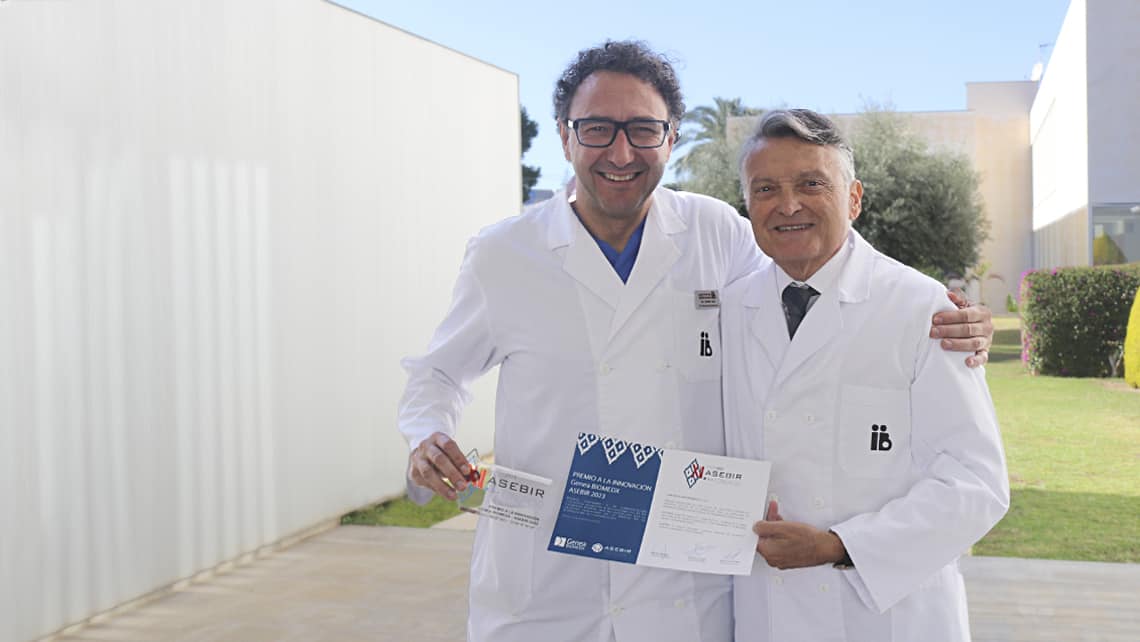Instituto Bernabeu designs an innovative technique that allows the selection of the most valid spermatozoa for the in vitro fertilisation process.
21-11-2023

- Selection of the best spermatozoa increases success rates in In Vitro Fertilisation processes.
- These cells act as a natural physical barrier selecting the sperm with better morphology, motility and DNA integrity in the natural environment.
- This method reduces sperm DNA fragmentation by 75% and results in a 60% to 70% increase in the production of high-quality embryos.
- The Project has received the Innovation Award at the ASEBIR 2023 Congress.
The team of researchers at Instituto Bernabeu led by Dr Jorge Ten, the embryology laboratory director at Instituto Bernabeu Group, has developed an innovative selection plate using the patient’s own granulosa cells to find the highest quality spermatozoa and, therefore, increasing the success rates in In Vitro Fertilization processes. “Granulosa cells are very important and are normally discarded in assisted reproduction cycles,” explains Dr Ten.
These cells act as a natural physical barrier selecting the sperm with better morphology, motility and DNA integrity in the natural environment. This new selection plate works in much the same way as in nature, allowing sperm to come into contact with the patient’s granulosa. Those spermatozoa that make it through all the layers and reach the end are the fittest. In fact, in a further study, the team assessed the DNA health of these sperm and observed a 75 % decrease in sperm DNA fragmentation, a process normally associated with reduced fertilisation and pregnancy rates.
The device is still under study, but preliminary results have shown a significant decrease in sperm DNA fragmentation and a 60-70% increase in the production of high-quality embryos. “These results promise substantial improvements in gestation rates, especially for couples with high sperm DNA fragmentation, although it could be performed in all couples undergoing IVF,” emphasized Dr Ten.
On the other hand, patients will not notice any change in the assisted reproduction process, but “gestation rates will increase due to the reduction of the damage suffered by the sperm,” explained Dr Jorge Ten, who assures that “once all the research phases have been completed, it can be applied in daily clinical practice.”
The Project known as “SUPERSPERM”, began with a pilot study in 2021 with 1,000 oocytes, where it was shown that sperm selected through granulosa cells generated better quality embryos. “From this point on, we realised the benefits were evident and they could even increase gestation rates. It was then that we decided to go further and design ourselves a homologated plate where this technique could be carried out in a simple, reproducible and safe way,” says the doctor. After two prototypes, they came up with the plates final design, which was produced by the Danish company Sparmed. This plate, composed of embryo-sterilised materials, is divided into two sections: one dedicated to intracytoplasmic microinjection (ICSI) and the other with lanes designed for granulosa cell and sperm depositions. This design aims to minimize risks and reduce the use of laboratory equipment.
This innovation is part of an extensive study in which researchers from the Instituto Bernabeu clinics in Madrid, Palma de Mallorca, Albacete and Alicante, as well as the Autonomous University of Madrid have collaborated with the genetics professor, Dr Jaime Gosalvez, who has been responsible for determining the spermatozoa DNA fragmentation.
The project is also supported by the Centre of Technological Development and Innovation, part of the Ministry of Science and Innovation, which granted financial support for the development of the device and a prospective randomised study to test it.
ASEBIR Innovation Award
This development has won the Innovation Award of the Association for the Study of Reproductive Biology Congress (ASEBIR) 2023, “a recognition of this project that undoubtedly represents an important advance in the study of fertility,” according to Dr Ten.
